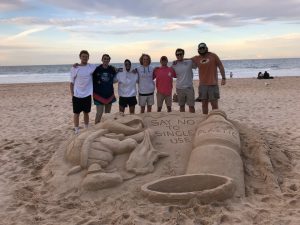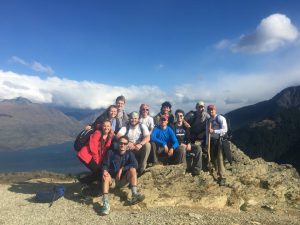

My anchor course for the certificate is FANR 4271, field studies in natural resources. I completed this course on a study abroad in Australia and New Zealand the summer after my sophomore year. Throughout this trip, I had the opportunity to travel to some extremely unique cities and environments and gained an understanding of how the issue of sustainability is viewed and understood by the people in these areas. In addition, I was able to educate myself on how societal, economic, and ecological factors in these regions will contribute to our hopes for a sustainable future.
Before this study abroad, I had never left the country and my travel experience was confined to the southeastern United States. As a result, my knowledge of issues of sustainability, climate change, and renewable energy was extremely limited. After being exposed to these issues firsthand, my perspective on ethical business practices and the impact people can have on nature changed drastically. One of the most evident examples of this was the damage to the great barrier reef that I had the opportunity to learn about and see firsthand at the eco-resort on Lady Elliot Island. Factors such as ocean acidification, rising temperatures, oil spills, and invasive species have led to the destruction of approximately 89% of new coral in the reef. As the southernmost point of the reef, Lady Elliot Island has remained far more pristine than most other locations farther north. However, it is clear that in the very near future the reef here will also die. This is something that weighs heavily on my mind because I was lucky enough to experience the sheer beauty of this place when so many other people and future generations will never have this chance. Because of this experience, I now understand how important it is to find the delicate balance between people, planet, and profit to preserve places like the great barrier reef all over the world.
Although I was in awe at my surroundings the entire time I was traveling through New Zealand, one place, in particular, blew me away. The destination I’m talking about is called Doubtful Sound and is the most remote and wild place I have ever been to. Travel to this area is highly regulated and I was lucky enough to stay in a student hostel at Deep Cove that is the only location in Doubtful Sound where you can stay the night other than on a boat. This isolation is the only thing preserving the ruggedness of Doubtful Sound where other places in the Fiordlands such as Milford Sound are being developed to cater to the tourism industry. My experience here changed my perception of the tourism industry and how large of an impact it can have on nature. However, I think this is a unique problem because I would never have developed these opinions without the exposure I had in Doubtful Sound. As a result, I think it’s crucial to strike a balance between people, planet, and profit in every aspect and practice sustainable and eco-tourism so that destinations like Doubtful Sound will remain for the foreseeable future.
The experiences I had at Lady Elliot Island, Doubtful Sound and the rest of my study abroad truly shaped my views on sustainability as well as my perception of the world. As a student of business, among other things, I now understand how crucial it is to balance the triple bottom line and practice business in a sustainable manner. In addition, I truly believe in the saying that “Nature is our greatest teacher” so I think it’s extremely important for people to have experiences like mine so that they can learn these same lessons.
